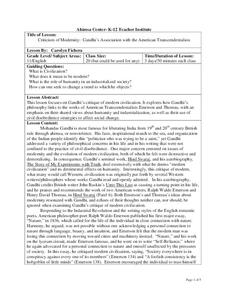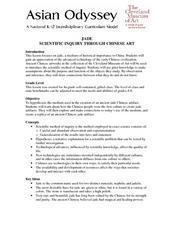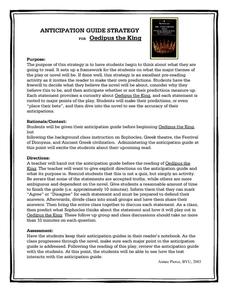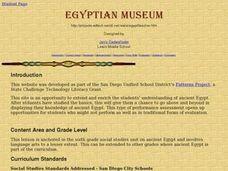Curated OER
Chapter 9: A Surprising Day and A Little Bit About China
Fifth graders complete activities with Chapter 9 of the book The Fastest Pig in the West by Randi Hacker. In this literature lesson, 5th graders discuss the concept of saving face and how it affects the main character's decisions....
Curated OER
Criticism of Modernity: Gandhi's Association with the American Transcendentalists
Eleventh graders explore Gandhi's philosophy links to the works of American Transcendentalists Emerson and Thoreau. In this transcendentalism lesson, 11th graders discuss essential questions about civilization and modernity.
Curated OER
Facial Tattoos or Face Painting
Students use a grid-like method to create a life-size self-portrait from a 3X5 black and white photo. They explore the different customs and rituals surrounding face painting from ancient through modern civilizations. Students create a...
Curated OER
Giants Of The Past
Students create a paper sculpture based on ancient Greek and Roman statues in the Getty Museum. In this paper sculpture lesson plan, students read the story The Mysterious Giant of Barletta by Tomie dePaola. They then make a sculpture...
Curated OER
Mysteries of Egypt
Students investigate the Egyptian civilization. In this cultural lesson, students watch the film Mysteries of Egypt and create a replica of an ancient Egyptian artifact.
Curated OER
Colossal Structures and Sculptures
Students discuss the connection between culture and art and why people create art. Students discuss Mt. Rushmore, The Sphinx, the goddess Athena, Roman columns, The Great Wall of China, The Buddha, and use tools and techniques to create ...
Curated OER
Moving With Your Roots
Students dissect common words to study the origins of those words. In this language arts lesson, students study the Greek and Latin roots found in many words within English language. Students use dictionaries to fill out worksheets...
Curated OER
Greek culture and Aesop's Fables
Tenth graders explain political and social thought during the Greek 6th and 5th centuries B.C. They research five to eight fables, figuring out the moral for each and writing an essay on how Aesop influenced the morals and ideals of...
Curated OER
Understanding Greek Mythology
Young scholars explore the role of Greek mythology in ancient Greek life. They discuss the origins of the Greek gods and goddesses, conduct Internet research, and present a project in the form of a dialogue between a Greek god and a...
Curated OER
Jade: Scientific Inquiry Through Chinese Art
Students discover the uses of Jade in Chinese art and society through in-class discussions, group projects, and internet research. Additional enrichment activities are included.
Curated OER
Ancient Chinese Tomb Building
Students compare and contrast the monuments erected for George Washington, the first president of the United States, and Qin Shi Huangdi (r. 221- 210 BCE), the first emperor of China. This lesson also includes a creative project.
Curated OER
Making Inferences
In this literature worksheet, 5th graders focus on making inferences. Students study 5 quotations from the story and respond to 2 short answer questions, drawing inferences from the information that is stated.
Curated OER
Egyptian Profile Portraits
Second graders design Egyptian style portraits. They use the correct proportions while drawing and painting the facial features.
Curated OER
Who Built the Pyramids?
High schoolers examine the two theories on how the pyramids at Giza were built. They watch a video on pyramids, take notes, and write a five-paragraph essay on how they think the pyramids were constructed.
Curated OER
Marbling Madness
Students create marbled prints by dipping paper through starch and acrylic paint.
Curated OER
The Three Doctrines & Legalism
Sixth graders imagine themselves to be, in turn, a follower of Buddhism, Taoism, Confucianism, and Legalism. They are given a handout that lists seven questions. Direct students to write down how they feel an individual would answer...
Curated OER
Spelling Rules for "IE' and "EI"
In this grammar worksheet, students identify and locate vocabulary words that apply to the spelling rules for "ie" and "ei." There are 30 words located in the word search.
Curated OER
Pottery Quest
Learners see that the production of ceramic pottery requires detailed knowledge of the physical properties of different clays and tempering materials, as well as knowledge about how these combine and react under specific firing conditions.
Novelinks
Oedipus the King: Anticipation Guide
Is it possible to escape fate? Are all types of pride evil? Are family secrets best kept secret? Before reading Oedipus the King, class members respond to a series of statements on an anticipation guide that introduces some of the basic...
Curated OER
Mini Coil Pots: Ceramics Lesson
Art is a wonderful way to teach historical or cultural concepts. Here, learners view a series of coil pots that have been created throughout history by a variety of civilizations. They then create and decorate a pot of their own that...
Curated OER
Ancient Mediterranean Trade Fair
Sixth graders begin the lesson by discussing how artifacts are located. In groups, they define the terms supply, demand, resources and trade and discuss how the United States is affected by International trade. They use this...
Curated OER
Argument in an Athenian Jail: Socrates and the Law
Students consider how Socrates might have responded to extenuating circumstances: for example, if his sentence had been imposed by a tyrant rather than in a trial, or if it had been influenced by prejudice.
Curated OER
Rock Speaks
Learners create primitive forms and caricatures to represent meaningful figures and/or events in their own lives, present their own works to the class, and attempt to interpret the relevant meaning from other students' work.
Curated OER
Egyptian Museum
Middle schoolers explore ancient Egypt. Using a specified Internet site, students locate and describe the physical setting that supported early civilizations in Egypt. They explain the relationship between polytheism and the social and...

























